英语综合考研李观仪新编英语教程4》翻译短语考研复习
全新版大学英语综合教程4课后翻译汇总(中英双语版)
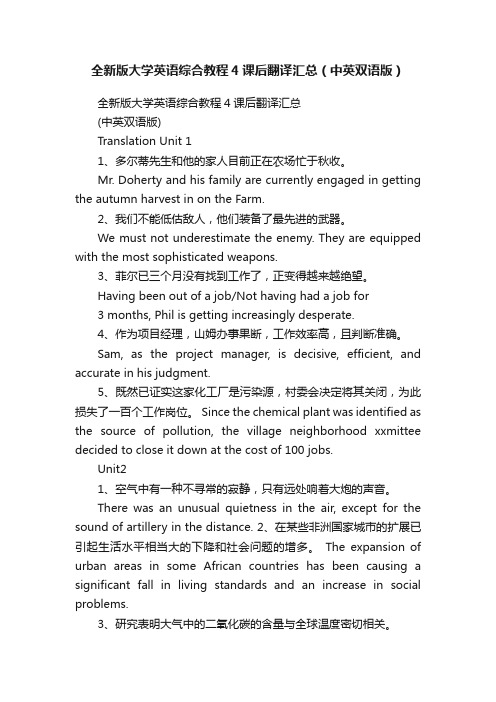
全新版大学英语综合教程4课后翻译汇总(中英双语版)全新版大学英语综合教程4课后翻译汇总(中英双语版)Translation Unit 11、多尔蒂先生和他的家人目前正在农场忙于秋收。
Mr. Doherty and his family are currently engaged in getting the autumn harvest in on the Farm.2、我们不能低估敌人,他们装备了最先进的武器。
We must not underestimate the enemy. They are equipped with the most sophisticated weapons.3、菲尔已三个月没有找到工作了,正变得越来越绝望。
Having been out of a job/Not having had a job for3 months, Phil is getting increasingly desperate.4、作为项目经理,山姆办事果断,工作效率高,且判断准确。
Sam, as the project manager, is decisive, efficient, and accurate in his judgment.5、既然已证实这家化工厂是污染源,村委会决定将其关闭,为此损失了一百个工作岗位。
Since the chemical plant was identified as the source of pollution, the village neighborhood xxmittee decided to close it down at the cost of 100 jobs.Unit21、空气中有一种不寻常的寂静,只有远处响着大炮的声音。
There was an unusual quietness in the air, except for the sound of artillery in the distance. 2、在某些非洲国家城市的扩展已引起生活水平相当大的下降和社会问题的增多。
研究生英语综合教程UNIT4课文及翻译(含汉译英英译汉)
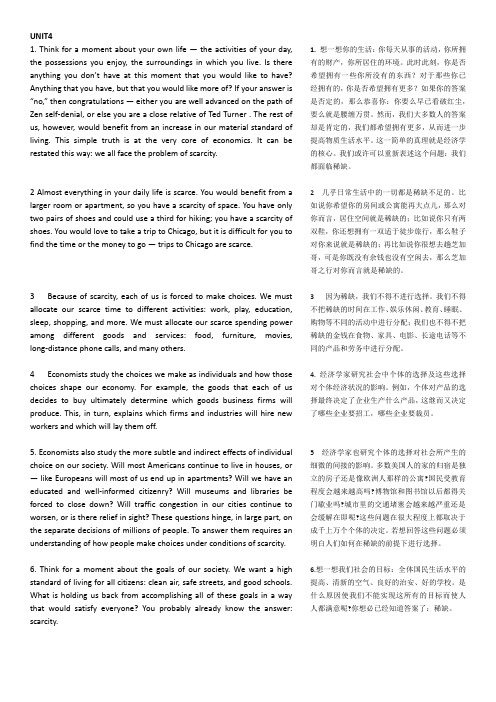
UNIT41. Think for a moment about your own life — the activities of your day, the possessions you enjoy, the surroundings in which you live. Is there anything you don’t have at this moment that you would like to have? Anything that you have, but that you would like more of? If your answer is “no,” then congratulations — either you are well advanced on the path of Zen self-denial, or else you are a close relative of Ted Turner . The rest of us, however, would benefit from an increase in our material standard of living. This simple truth is at the very core of economics. It can be restated this way: we all face the problem of scarcity.2 Almost everything in your daily life is scarce. You would benefit from a larger room or apartment, so you have a scarcity of space. You have only two pairs of shoes and could use a third for hiking; you have a scarcity of shoes. You would love to take a trip to Chicago, but it is difficult for you to find the time or the money to go — trips to Chicago are scarce.3 Because of scarcity, each of us is forced to make choices. We must allocate our scarce time to different activities: work, play, education, sleep, shopping, and more. We must allocate our scarce spending power among different goods and services: food, furniture, movies, long-distance phone calls, and many others.4 Economists study the choices we make as individuals and how those choices shape our economy. For example, the goods that each of us decides to buy ultimately determine which goods business firms will produce. This, in turn, explains which firms and industries will hire new workers and which will lay them off.5. Economists also study the more subtle and indirect effects of individual choice on our society. Will most Americans continue to live in houses, or — like Europeans will most of us end up in apartments? Will we have an educated and well-informed citizenry? Will museums and libraries be forced to close down? Will traffic congestion in our cities continue to worsen, or is there relief in sight? These questions hinge, in large part, on the separate decisions of millions of people. To answer them requires an understanding of how people make choices under conditions of scarcity.6. Think for a moment about the goals of our society. We want a high standard of living for all citizens: clean air, safe streets, and good schools. What is holding us back from accomplishing all of these goals in a way that would satisfy everyone? You probably already know the answer: scarcity. 1. 想一想你的生活:你每天从事的活动,你所拥有的财产,你所居住的环境。
全新版大学英语综合教程4课文参考译文
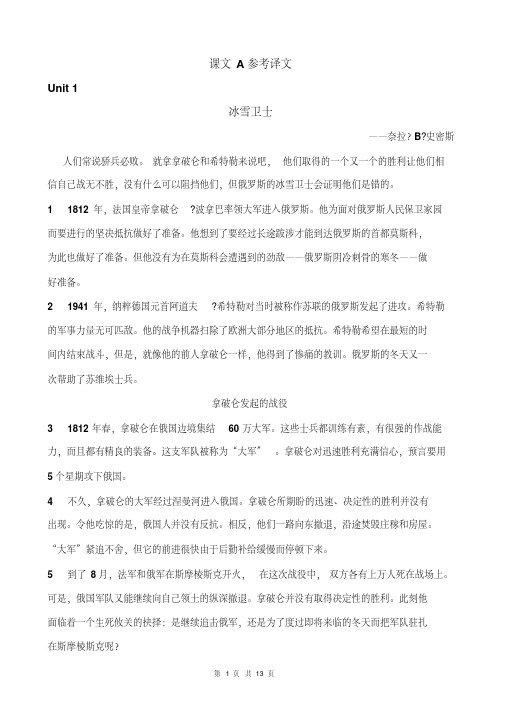
课文A参考译文Unit 1冰雪卫士——奈拉?B?史密斯人们常说骄兵必败。
就拿拿破仑和希特勒来说吧,他们取得的一个又一个的胜利让他们相信自己战无不胜,没有什么可以阻挡他们,但俄罗斯的冰雪卫士会证明他们是错的。
1 1812年,法国皇帝拿破仑?波拿巴率领大军进入俄罗斯。
他为面对俄罗斯人民保卫家园而要进行的坚决抵抗做好了准备。
他想到了要经过长途跋涉才能到达俄罗斯的首都莫斯科,为此也做好了准备。
但他没有为在莫斯科会遭遇到的劲敌——俄罗斯阴冷刺骨的寒冬——做好准备。
2 1941年,纳粹德国元首阿道夫?希特勒对当时被称作苏联的俄罗斯发起了进攻。
希特勒的军事力量无可匹敌。
他的战争机器扫除了欧洲大部分地区的抵抗。
希特勒希望在最短的时间内结束战斗,但是,就像他的前人拿破仑一样,他得到了惨痛的教训。
俄罗斯的冬天又一次帮助了苏维埃士兵。
拿破仑发起的战役3 1812年春,拿破仑在俄国边境集结60万大军。
这些士兵都训练有素,有很强的作战能力,而且都有精良的装备。
这支军队被称为“大军”。
拿破仑对迅速胜利充满信心,预言要用5个星期攻下俄国。
4 不久,拿破仑的大军经过涅曼河进入俄国。
拿破仑所期盼的迅速、决定性的胜利并没有出现。
令他吃惊的是,俄国人并没有反抗。
相反,他们一路向东撤退,沿途焚毁庄稼和房屋。
“大军”紧追不舍,但它的前进很快由于后勤补给缓慢而停顿下来。
5 到了8月,法军和俄军在斯摩棱斯克开火,在这次战役中,双方各有上万人死在战场上。
可是,俄国军队又能继续向自己领土的纵深撤退。
拿破仑并没有取得决定性的胜利。
此刻他面临着一个生死攸关的抉择:是继续追击俄军,还是为了度过即将来临的冬天而把军队驻扎在斯摩棱斯克呢?6 拿破仑决定冒险向远在448公里之外的莫斯科进发。
1812年9月7日,法俄两军在鲍罗季诺展开激烈的战斗,此地在莫斯科以西112公里外。
夜幕降临时,法军和俄军分别有3万和4.4万名士兵的死伤。
7 俄国军队再次撤退到安全的地方。
unit4-硕士英语综合教程-课文翻译及重点词汇标记
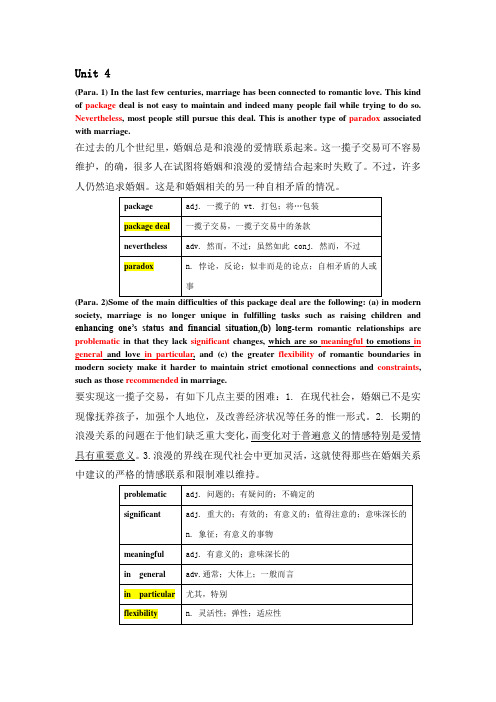
Unit 4(Para. 1) In the last few centuries, marriage has been connected to romantic love. This kind of package deal is not easy to maintain and indeed many people fail while trying to do so. Nevertheless, most people still pursue this deal. This is another type of paradox associated with marriage.在过去的几个世纪里,婚姻总是和浪漫的爱情联系起来。
这一揽子交易可不容易维护,的确,很多人在试图将婚姻和浪漫的爱情结合起来时失败了。
不过,许多人仍然追求婚姻。
这是和婚姻相关的另一种自相矛盾的情况。
package adj. 一揽子的 vt. 打包;将…包装package deal 一揽子交易,一揽子交易中的条款nevertheless adv. 然而,不过;虽然如此 conj. 然而,不过paradox n. 悖论,反论;似非而是的论点;自相矛盾的人或事(Para. 2)Some of the main difficulties of this package deal are the following: (a) in modern society, marriage is no longer unique in fulfilling tasks such as raising children and enhancing one’s status and financial situation,(b) long-term romantic relationships are problematic in that they lack significant changes, which are so meaningful to emotions in general and love in particular, and (c) the greater flexibility of romantic boundaries in modern society make it harder to maintain strict emotional connections and constraints, such as those recommended in marriage.要实现这一揽子交易,有如下几点主要的困难:1. 在现代社会,婚姻已不是实现像抚养孩子,加强个人地位,及改善经济状况等任务的惟一形式。
全新版大学英语综合教程4课后句子翻译汇合

全新版大学英语综合教程4课后句子翻译汇合U1 P201.Mr. Doherty and his family are currently engaged in gettingthe autumn harvest in on the farm.多尔蒂先生和他的家人目前正在农场忙于秋收。
2.We must not underestimate the enemy. They are equippedwith the most sophisticated weapons.我们不能低估敌人,他们装备了最先进的武器。
3.Having been cut of a job/Not having had a job for 3months,Phil is getting increasingly desperate.菲尔已经三个月没有找到工作了,正在变得越来越绝望。
4.Sam, as the project manager, is decisive, efficient, andaccurate in his judgment.作为项目经理,山姆办事果断,工作效率高,且判断准确。
5.Since the chemical plant was identified as the source ofsolution, the village neighborhood committee decided to closeit down at the cost of 100 jobs. 既然已经证实这家化工厂是污染源,村委会决定将其关闭,为此损失了一百个工作岗位。
The offensive had already lasted three days, but we hadnot gained much ground. The division commander instructedour battalion to get around to the rear of the enemy andlaunch a surprise attack. T o do so, however, we had to cross a、管路敷设技术通过管线不仅可以解决吊顶层配置不规范高中资料试卷问题,而且可保障各类管路习题到位。
全新版大学英语综合教程4课文原文及翻译 背诵段落

They say that pride comes before a fall. In the case of both Napoleon and Hitler, the many victories they enjoyed led them to believe that anything was possible, that nothing could stand in their way. Russia's icy defender was to prove them wrong.人道是骄兵必败。
就拿拿破仑和希特勒两人来说吧,他们所向披靡,便以为自己战无不胜,不可阻挡。
但俄罗斯的冰雪卫士证明他们错了。
The Icy DefenderNila B. Smith1 In 1812, Napoleon Bonaparte, Emperor of the French, led his Grand Army into Russia. He was prepared for the fierce resistance of the Russian people defending their homeland. He was prepared for the long march across Russian soil to Moscow, the capital city. But he was not prepared for the devastating enemy that met him in Moscow -- the raw, bitter, bleak Russian winter.冰雪卫士奈拉·B·史密斯1812年,法国皇帝拿破仑·波拿巴率大军入侵俄罗斯。
他准备好俄罗斯人民会为保卫祖国而奋勇抵抗。
他准备好在俄罗斯广袤的国土上要经过长途跋涉才能进军首都莫斯科。
英语综合考研李观仪《新编英语教程4》考研词汇复习资料
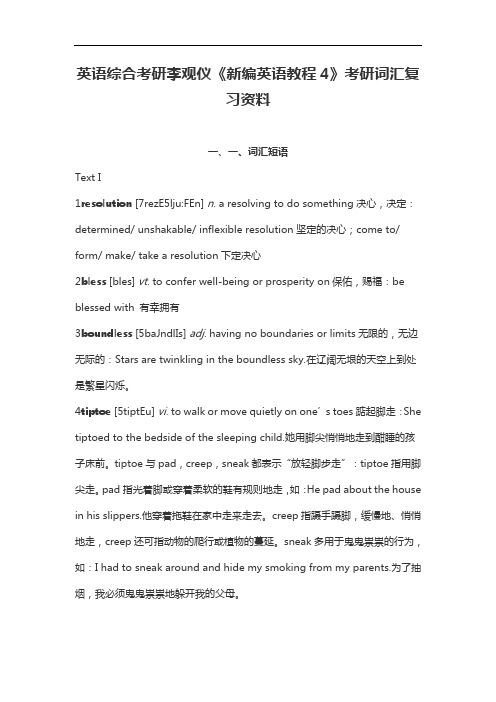
英语综合考研李观仪《新编英语教程4》考研词汇复习资料一、一、词汇短语Text I1resolution [7rezE5lju:FEn] n. a resolving to do something决心,决定:determined/ unshakable/ inflexible resolution坚定的决心;come to/ form/ make/ take a resolution下定决心2bless [bles] vt. to confer well-being or prosperity on保佑,赐福:be blessed with 有幸拥有3boundless [5baJndlIs] adj. having no boundaries or limits无限的,无边无际的:Stars are twinkling in the boundless sky.在辽阔无垠的天空上到处是繁星闪烁。
4tiptoe [5tiptEu] vi. to walk or move quietly on one’s toes踮起脚走:She tiptoed to the bedside of the sleeping child.她用脚尖悄悄地走到酣睡的孩子床前。
tiptoe与pad,creep,sneak都表示“放轻脚步走”:tiptoe指用脚尖走。
pad指光着脚或穿着柔软的鞋有规则地走,如:He pad about the house in his slippers.他穿着拖鞋在家中走来走去。
creep指蹑手蹑脚,缓慢地、悄悄地走,creep还可指动物的爬行或植物的蔓延。
sneak多用于鬼鬼祟祟的行为,如:I had to sneak around and hide my smoking from my parents.为了抽烟,我必须鬼鬼祟祟地躲开我的父母。
5spontaneous [spCn5teinjEs, -niEs] adj. arising from a natural inclination or impulse and not from external incitement or constraint自发的,自然产生的。
《综合英语教程(4)》课后翻译

第三单元p581.这样的好机会千载难逢。
once in a blue moonAn opportunity as good as this arises/occurs only once in a blue moon.2.这个孩子因为私自拿了母亲包里的钱而觉得十分愧疚。
guilty ofThe boy felt guilty for taking money from his mother’s handbag without permission.3.她知道他的话一句真的也没有。
give credence toShe did not give credence to a single word of his story.4.一般来说,老师对学生的错误都比较宽容。
be tolerant ofGenerally speaking,teachers are tolerant of their students’ mistakes.5.我想当然地以为你会跟我们一起来,于是就给你买了票。
take… for grantedI took it for granted that you’d want to come with us,so I bought you a ticket.6.由于经理的不断劝导,工作人员很快就改掉了迟到的坏习惯。
break the habit Thanks to the manager’s repeated counseling,the staff soon broke the bad habit of co ming late to work.7.他现在对她发火,但不久会原谅她的。
这只是几小时的事,仅此而已。
a matter of, that’s allHe’s furious with her now,but he’ll forgive her soon.It’s just/only a matter of a few h ours,that’s all.第四单元p791.他没当成歌星,却成了一位十分成功的商人。
《新编英语教程》第四册unit4text2译文
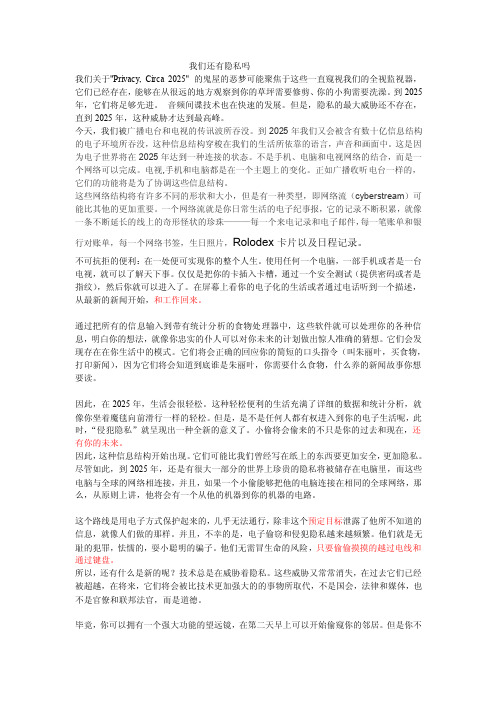
我们还有隐私吗我们关于"Privacy, Circa 2025" 的鬼屋的恶梦可能聚焦于这些一直窥视我们的全视监视器,它们已经存在,能够在从很远的地方观察到你的草坪需要修剪、你的小狗需要洗澡。
到2025年,它们将足够先进。
音频间谍技术也在快速的发展。
但是,隐私的最大威胁还不存在,直到2025年,这种威胁才达到最高峰。
今天,我们被广播电台和电视的传讯波所吞没。
到2025年我们又会被含有数十亿信息结构的电子环境所吞没,这种信息结构穿梭在我们的生活所依靠的语言,声音和画面中。
这是因为电子世界将在2025年达到一种连接的状态。
不是手机、电脑和电视网络的结合,而是一个网络可以完成。
电视,手机和电脑都是在一个主题上的变化。
正如广播收听电台一样的,它们的功能将是为了协调这些信息结构。
这些网络结构将有许多不同的形状和大小,但是有一种类型,即网络流(cyberstream)可能比其他的更加重要。
一个网络流就是你日常生活的电子纪事报,它的记录不断积累,就像一条不断延长的线上的奇形怪状的珍珠———每一个来电记录和电子邮件,每一笔账单和银行对账单,每一个网络书签,生日照片,Rolodex卡片以及日程记录。
不可抗拒的便利:在一处便可实现你的整个人生。
使用任何一个电脑,一部手机或者是一台电视,就可以了解天下事。
仅仅是把你的卡插入卡槽,通过一个安全测试(提供密码或者是指纹),然后你就可以进入了。
在屏幕上看你的电子化的生活或者通过电话听到一个描述,从最新的新闻开始,和工作回来。
通过把所有的信息输入到带有统计分析的食物处理器中,这些软件就可以处理你的各种信息,明白你的想法,就像你忠实的仆人可以对你未来的计划做出惊人准确的猜想。
它们会发现存在在你生活中的模式。
它们将会正确的回应你的简短的口头指令(叫朱丽叶,买食物,打印新闻),因为它们将会知道到底谁是朱丽叶,你需要什么食物,什么养的新闻故事你想要读。
因此,在2025年,生活会很轻松。
英语综合考研李观仪《新编英语教程》考研资料

英语综合考研李观仪《新编英语教程》考研资料一、一、单元语法本单元主要涉及一般现在时、现在完成时、一般过去时和一般将来时的被动语态。
被动语态表示主语是动作的承受者,由“助动词be+过去分词”构成,表达“被、受、由”之意。
一般用于以下几种情况:(1)不知道谁是动作的执行者It is found that Tom was murdered.有人发现汤姆被谋杀了。
(2)没有必要指出谁是动作的执行者Fresh fruit is sold in this market.这个市场出售新鲜水果。
(3)强调动作的承受者“A Tale of Two Cities”was written by Dickens.《双城记》的作者是狄更斯。
(4)有些情况如公告、通知、报纸标题等,有时用被动语态(被动结构)更适宜。
No books are to be taken out of the reading room.书籍不得带出阅览室。
现以动词do为例,列出上述四种时态的被动语态:(1)一般现在时:is / am / are + doneHow is this word pronounced? 这个单词怎么发音?(2)现在完成时:have / has + been doneAll the work has been finished.所有工作都已完成了。
(3)一般过去时:was / were + doneShe was asked to sing a song.大家要求她唱首歌。
(4)一般将来时:will / shall + be done或is / am / are going to + be done Some of you will be sent to America for further training.你们中有些人将被送到美国接受进一步的培训。
The trees are going to be planted in this area.这些树将被种植在这个区域。
新编英语教程4 李观仪 练习册全部翻译

新编英语教程4 李观仪练习册全部翻译新编英语教程4Unit 11.每当他午夜下班回家,他总是蹑手蹑脚地上楼,以免吵醒邻居。
Every time he returned home from work at midnight, he would tiptoe upstairs, trying not to disturb his neighbors. 2.为了与新来的邻居建立一种和睦的关系,格林先生不失时机地主动帮她把行李搬进屋子。
To establish some kind ofrapport with his new neighbor, Mr. Jones lost no chance in offering to carry her luggage into the house. 3.米勒博士向我们推荐的文章集中论述了空气污染问题,同时也提到了诸如水污染,噪音污染和视觉污染等问题。
The article recommended by Dr. Miller centers on the problem of air pollution; meanwhile, it touches upon other issues such as water pollution, noise pollution and visual pollution.4.要不是她的朋友时常鼓励她、帮助她,她将一事无成。
If it had not been for the constant encouragement and help from her friends, she couldn’t have accomplished anything.5.几天前他还对这项计划嗤之以鼻,可是他现在却以高涨的热情去努力落实这项计划,这真是令人难以理解的转变。
It was only a few days ago that he was full of contempt for the new project, but he is now working hard with zest for its realization. Whata baffling change!6.从她的自传可以断定,她对那名钢琴师始终怀有着一种复杂的感情。
李观仪《新编英语教程》学习指南【词汇短语+课文精解+全文翻译+练习答案】-unit10~unit12
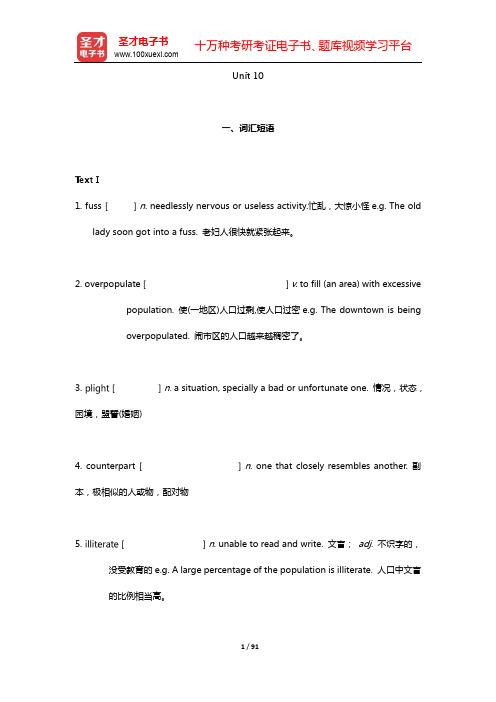
Unit 10一、词汇短语Text I1. fuss n. needlessly nervous or useless activity.忙乱,大惊小怪e.g. The oldlady soon got into a fuss. 老妇人很快就紧张起来。
2. overpopulate v. to fill (an area) with excessivepopulation. 使(一地区)人口过剩,使人口过密e.g. The downtown is beingoverpopulated. 闹市区的人口越来越稠密了。
3. n. a situation, specially a bad or unfortunate one. 情况,状态,困境,盟誓(婚姻)4. counterpart n. one that closely resembles another. 副本,极相似的人或物,配对物5. n. unable to read and write. 文盲;adj. 不识字的,没受教育的e.g. A large percentage of the population is illiterate. 人口中文盲的比例相当高。
6. assist v. to gor supplement. 援助,帮助;通常用作assist sb. in doing sth. 或assist sb. with sth.即“帮助某人做某事”。
7. interrogate v.to examine by questioning formally orofficially. 审问,询问e.g. I interrogated everyone even slightly involved. 我审问了每个人,即便是稍有关联的人也在其中。
8. prying adj. insistently or impertinently curious or inquisitive. 窥视的,窥探的,爱打听的e.g. You are such a prying student. 你真是个爱打听的学生。
新编英语教程4 译文
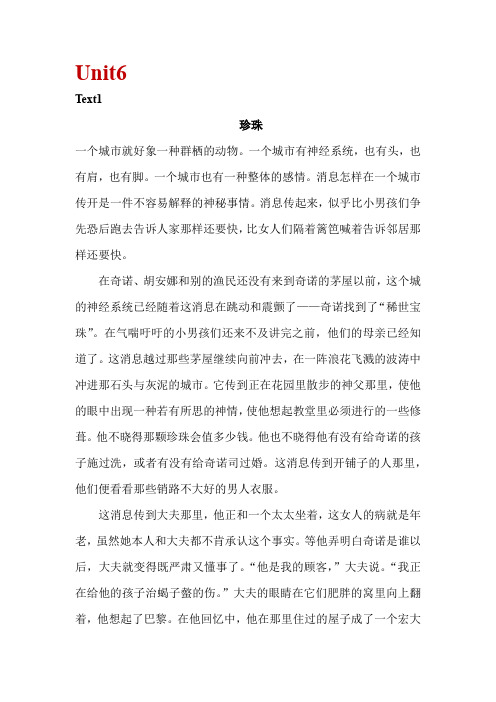
Unit6Text1珍珠一个城市就好象一种群栖的动物。
一个城市有神经系统,也有头,也有肩,也有脚。
一个城市也有一种整体的感情。
消息怎样在一个城市传开是一件不容易解释的神秘事情。
消息传起来,似乎比小男孩们争先恐后跑去告诉人家那样还要快,比女人们隔着篱笆喊着告诉邻居那样还要快。
在奇诺、胡安娜和别的渔民还没有来到奇诺的茅屋以前,这个城的神经系统已经随着这消息在跳动和震颤了——奇诺找到了“稀世宝珠”。
在气喘吁吁的小男孩们还来不及讲完之前,他们的母亲已经知道了。
这消息越过那些茅屋继续向前冲去,在一阵浪花飞溅的波涛中冲进那石头与灰泥的城市。
它传到正在花园里散步的神父那里,使他的眼中出现一种若有所思的神情,使他想起教堂里必须进行的一些修葺。
他不晓得那颗珍珠会值多少钱。
他也不晓得他有没有给奇诺的孩子施过洗,或者有没有给奇诺司过婚。
这消息传到开铺子的人那里,他们便看看那些销路不大好的男人衣服。
这消息传到大夫那里,他正和一个太太坐着,这女人的病就是年老,虽然她本人和大夫都不肯承认这个事实。
等他弄明白奇诺是谁以后,大夫就变得既严肃又懂事了。
“他是我的顾客,”大夫说。
“我正在给他的孩子治蝎子螫的伤。
”大夫的眼睛在它们肥胖的窝里向上翻着,他想起了巴黎。
在他回忆中,他在那里住过的屋子成了一个宏大奢华的地方,跟他同居过的面貌难看的女人成了一个又美丽又体贴的少女,尽管她完全不是那么回事。
大夫的眼光越过他那年老的病人,看到自己坐在巴黎的一家餐馆里,一个侍者正在打开一瓶酒。
这消息一早就传到教堂前面的乞丐们那里,使他们高兴得吃吃地笑了一阵,因为他们知道世界上没有比一个突然走运的穷人更大方的施舍者了。
奇诺找到了“稀世宝珠”。
在城里,在一些小铺子里,坐着那些向渔夫收买珍珠的人。
他们在椅子上坐着等待珍珠送进来,然后他们就唠叨,争吵,叫嚷,威胁,直到他们达到那渔夫肯接受的最低的价钱。
可是他们杀价也不敢超过一个限度,因为曾经有一个渔夫由于绝望,把他的珍珠送给了教会。
全新版大学英语综合教程四 第4单元词组翻译

Phrases for Sentence-making and Translation, Unit 4,Book 4 (全新版)I. Phrases for sentence-makingText ASweep asideMake no/little difference A handful ofAt odds withBe committed toA variety ofLet aloneStrike a balance Text BWith good reason Phase outIn evidenceSo be itAdd toTake advantage of A majority of You betBlow upII. Translation1. 因为约翰不看好欧洲经济,所以把资产转移到了欧洲以外的其他地方。
(asset, elsewhere, outlook)Due to his pessimistic outlook on the European economy, John has moved his assets from Europe to elsewhere.2. 我喜欢雇佣年轻人。
他们愿意学习,而且忠于职守。
(be committed to, earnest)I like hiring young people. They are earnest learners and committed to work.3. 她的女友们以自己的孩子为中心。
(center)Her girl friends center their lives on their children.4. 玛丽更在意个人成长。
Mary cares more about her personal growth.5. 有一大批同事和你意见不合,这是怎么回事?(at odds with, considerable)Why is it that a considerable number of colleagues are at odds with you?6. 政府出台了一系列政策加强同法国的合作。
新编英语教程4_李观仪版练习册答案
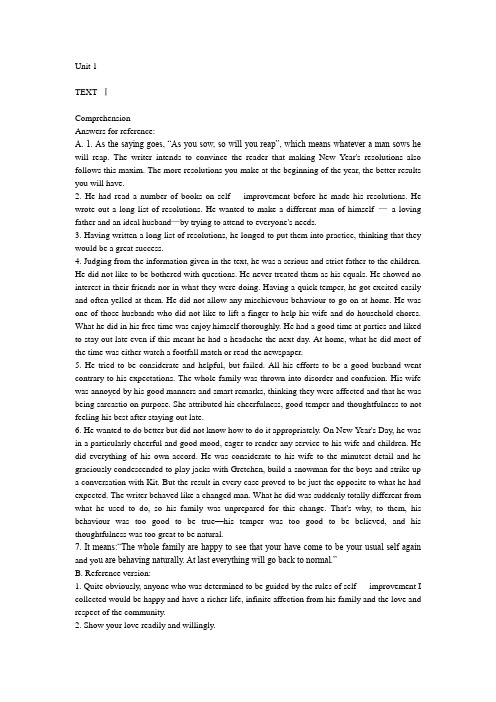
Unit 1TEXT ⅠComprehensionAnswers for reference:A. 1. As the saying goes, “As you sow, so will you reap”, which means whatever a man sows he will reap. The writer intends to convince the reader that making New Year's resolutions also follows this maxim. The more resolutions you make at the beginning of the year, the better results you will have.2. He had read a number of books on self improvement before he made his resolutions. He wrote out a long list of resolutions. He wanted to make a different man of himself —a loving father and an ideal husband—by trying to attend to everyone's needs.3. Having written a long list of resolutions, he longed to put them into practice, thinking that they would be a great success.4. Judging from the information given in the text, he was a serious and strict father to the children. He did not like to be bothered with questions. He never treated them as his equals. He showed no interest in their friends nor in what they were doing. Having a quick temper, he got excited easily and often yelled at them. He did not allow any mischievous behaviour to go on at home. He was one of those husbands who did not like to lift a finger to help his wife and do household chores. What he did in his free time was enjoy himself thoroughly. He had a good time at parties and liked to stay out late even if this meant he had a headache the next day. At home, what he did most of the time was either watch a footfall match or read the newspaper.5. He tried to be considerate and helpful, but failed. All his efforts to be a good busband went contrary to his expectations. The whole family was thrown into disorder and confusion. His wife was annoyed by his good manners and smart remarks, thinking they were affected and that he was being sarcastio on purpose. She attributed his cheerfulness, good temper and thoughtfulness to not feeling his best after staying out late.6. He wanted to do better but did not know how to do it appropriately. On New Year's Day, he was in a particularly cheerful and good mood, eager to render any service to his wife and children. He did everything of his own accord. He was considerate to his wife to the minutest detail and he graciously condescended to play jacks with Gretchen, build a snowman for the boys and strike up a conversation with Kit. But the result in every case proved to be just the opposite to what he had expected. The writer behaved like a changed man. What he did was suddenly totally different from what he used to do, so his family was unprepared for this change. That's why, to them, his behaviour was too good to be true—his temper was too good to be believed, and his thoughtfulness was too great to be natural.7. It means:“The whole family are happy to see that your have come to be your usual self again and yo u are behaving naturally. At last everything will go back to normal.”B. Reference version:1. Quite obviously, anyone who was determined to be guided by the rules of self improvement I collected would be happy and have a richer life, infinite affection from his family and the love and respect of the community.2. Show your love readily and willingly.3. Whole hearted and genuine praise is really valuable.4. Join your children and treat them as your equals.5. I heard screams down the hall one after another and I found Gretchen crying.6. The most unimportant light task may turn out to be worthwhile if it is dealt with eagerly and with interest.7. I started to have a conversation with Kit in a friendly way and tried my best to achieve close agreement and understanding between us.8. You never troubled yourself to chat with people in the past. Why do you want to start doing it now?TEXT ⅡComprehension1. F (He knew this beforehand, but he had to go there because he felt the bank was the only place to keep his money safely.)2. T3. F (The manager said “Good morning”not to Mr. Montgomery, but to the writer. “Good morning”in this case is not a greeting, but a farewell, meaning “Good bye”.)4. F (The clerks were at first astonished, and then amused.)5. F (He was never very rich. All he saved were some silver dollars in a sock.)K 13TEXT ⅢComprehension1. C2. B3. A4. C5. AGUIDED WRITINGSentence CombinationReference version:It is much less common for people to carry cash in the West than it is for people to carry cash in China. Often it is not safe to have large amounts of cash on hand in the West.Most people use cheques or credit cards to avoid carrying cash with them. Cheques are commonly used to pay rent, for utilities, and telephone bills and can also be used to make purchases while credit cards are mainly used to make purchases.Credit cards are pieces of plastic, usually 5.5cm. by 8.5cm. They are issued by banks and stores that want people to spend more money. When purchasing something, the buyer will give his credit card to the seller. The seller will check the information on the card and record it, accept the card instead of accepting money. The seller will give the buyer a receipt and another receipt goes to the bank. The bank will then send a bill to the buyer, usually after 30 days.COMPREHENSIVE EXERCISESⅠ. Spelling1. downstairs2. spontaneous3. creativity4. jovially5. wander6. shriek7. chore8. poisonous9. relieve10. interruption11. reckless12. wretchedⅡ. DictationThe United States is becoming more and more a “cashless society”. People are making purc hases by cheque, charge accounts or credit cards, rather than carrying large amounts of money in their pockets or purses.Normally people pay by cheque at the end of each month at department stores and some food markets and drugstores. They also pay monthly by cheque for rent, telephone calls, electricity, milk, newspaper deliveries, and similar household expenses. Mary have charge cards to pay for petrol and service station expenses and credit cards for restaurant, hotel, and travel costs.Many other people, however, prefer to pay as they go and not accumulate monthly bills. Most people work out a combination, paying some bills in cash and charging others. This is a matter of personal choice. But if you have charge accounts, be sure to pay promptly; the interest charged for late payments can be high.K 14Ⅲ. Listening ComprehensionA. Income: £2000 a yearExpensesHousing: £50 a month for mortgageFood: £60 a monthCar: a large repair bill every now and thenElectricity: £16 a yearGas: £70 a yearBooks: /B. The man on the doorstep says he is doing a survey for the Department of Health and Social Security. He is actually a salesman, trying to sell The New World Children's Encyclopaedia.Ⅳ. TranslationA. 1. Every time he returned home from work at midnight, he would tiptoe upstairs, trying not to disturb his neighbours.2. To establish some kind of rapport with his new neighbour, Mr.Jones lost no chance in offering to carry her luggage into the house.3. The article recommended by Dr. Miller centres on the problem of air pollution; meanwhile, it touches upon other issues such as water pollution, noise pollution and visual pollution.4. If it had not been for the constant encouragement and help from her friends, she couldn't have accomplished anything.5. It was only a few days ago that he was full of contempt for the new project, but he is now working hard with zest for its realization. What a baffling change!6. Judging from what she wrote in her autobiography, she always had mixed feelings for that pianist.7. While waiting in the lounge for the flight, he struck up a conversation with two American travellers and touched on many interesting cross cultural issues.8. These girls all dread working alone on night duty.9. I don't mind working overtime. What I do mind is working on those insignificant trivial thingsduring the weekend.10. Actually nobody asked them to do anything on the first day of school. When they saw the classroom in such a mess, however, they cleaned it spontaneously.B. Reference version:K 15Joe had dodged the police many times, but never like this. He was afraid. He was sprawled on the rooflistening for sounds. Somewhere below people were yelling and shrieking, but he was not concerned about the commotion. He looked round, searching for any sign of a policeman. When he heard some footsteps on the corrugated iron roof, he was seized with fear. What made them chase after me, he thought. I haven't done anything. You shouldn't have sneaked up here, he said to himself.Then he saw the shape of a policeman approaching. He did not want to give up. He still wanted to make an effort to escape. He rose to his feet quietly and tiptoed over to the far end of the roof, thinking that he could perhaps slide down the drainpipe. Just at that moment, the policeman strode forward and was about to grab the boy by the collar when, unaware of a clothesline in his way which caught his cap, he almost stumbled. Joe was startled, but he could go back no further. The policeman steadied himself and reached out for the boy.Ⅴ.Blank FillingA. 1. down 2. for 3. down, down4. after5. back6. on7. in8. off9. out10. for11. in, out12. out13. to14. over15. upB. (1) name(2) sell(3) things(4) exchange(5) shares(6) other(7) business(8) partial(9) then(10) company(11) kinds(12) shares(13) wealthy(14) expenses(15) hope(16) stock(17) rich(18) money(19) reasons(20) general(21) investors(22) gamble(23) investing(24) glad(25) willing(26) worldC. (1) failed(2) game(3) sketches(4) down(5) Only(6) that(7) weapon(8) comic(9) did(10) characters(11) to(12) for(13) ran(14) dropped(15) turned(16) up(17) title(18) made(19) later(20) fans(21) funny(22) being(23) put(24) reach(25) inD. (1) was blessed with(2) boundless love(3) encouraged creativity in the young(4) was spontaneous(5) on(6) tired of(7) with more zest(8) worth its weight in gold(9) admiration of the community(10) swarmed aroundK 16(11) drawn by(12) struck up a conversation with(13) established a kind of rapport(14) was about four fifths done(15) was in a poisonous mood(16) sneak up on(17) ten year old(18) would have thrown in the sponge(19) were about to perform open heart surgery onⅥ. NounVerbAdjectiveAdverb1. creativitycreatecreativecreatively2. beautybeautifybeautifulbeautifully3. resolutionresolveresoluteresolutely4. moralitymoralizemoralmorally5. illustrationillustrateillustrativeillustratively6. suggestionsuggestsuggestivesuggestively7. collectioncollectcollectivecollectively8. admirationadmireadmirableadmirably9. differencedifferdifferentdifferently10. imaginationimagineimaginativeimaginatively11. harmonyharmonizeharmoniousharmoniously12. impressivenessimpressimpressiveimpressively13. distributiondistributedistributivedistributively14. explanationexplainexplanatoryexplanatorily15. disappointmentdisappointdisappointingdisappointinglyUnit 2TEXT ⅠComprehensionAnswers for reference:A. 1. English has now become one of the most widely used languages in the world. In 1500, English was an insignificant language, spoken by the people living on a small island. Now it is spoken as the first language by over a quarter of a billion people and as a second language by many millions more. When people speak English, we may be able to tell which English it is—American English, Australian English, British English, Indian English and so on. Besides, for different purposes, we use different Englishes: everyday English, business English, commercial English, diplomatic English, medical English, scientific English, technical English, legal English, journalistic English and so on. We also use different degrees of formality and can differentiate between formal English, informal English, and colloquial English.2. Style expresses the writer's individuality through his choice of words and sentence patterns, and his selection and arrangement of material. Style frequently reflects the writer's personality, mood, attitudes, education, and general background. There are different kinds of styles: homely, coarse, refined, ironic, vulgar, plain, childlike, formal, informal, wordy, colloquial, direct, grandiloquent, and so on. We choose words to suit the audience, the occasion, the topic, and the genre (e.g., short story, essay, argumentation). Certain words, exact and concrete as they are, are excluded fromformal use, because they are not appropriate for formal occasions. It would be absurd if slang terms or vulgarisms were used to address an audience at commencement, or the other way round, if a very formal style, long sentences and complex grammatical structures were used in a friendly letter. Yet if we have some idea of different styles, but don't know when to use which, this knowledge is worse than useless.3. This is an example of a very formal expression alongside a colloquialism. Bags of fun is a slang term whereas extremely gracious is very formal language.Here is another example of the same kind to show the inappropriateness of a formal style mixed with colloquialism. In a letter of application, you begin thus:Dear Sirs,I am writing to you in the hope that you still have a vacant place in your department. If you hve not yet employed anyone, I should like my application for the position to be considered....And you conclude with:As to my character and fitness for the job, please rest assured that I am sure smart. In this last sentence, job may be rather too informal; employment or post would be more suitable. Smart is a colloquialism that means “mentally alert, quick witted, and t alented”. Moreover, the sentence I am sure smart is very informal and colloquial, and so it is inappropriate for the letter.4. Good use of English requires the appropriate choice of words for the expression of thoughts. To be in “good use of English”, therefore, a word must be used appropriately in a specific set of circumstances.K 225. Coy means “shy, diffident, bashful”. What the writer means here is:“Do away with your shyness. Decide what you want to say and say it as directly as possible in plain words. Stop deceiving people and beating about the bush. Call a spade a spade.”6. Some examples of euphemisms:1) a mental home (=an insane asylum)slow (=dull in mind)residence (=house)a reconditioned automobile (=a used car)stout (=fat)The above words and phrases in italics are supposed to be more pleasant substitutes for those in parentheses.2) skin tonic (=cold cream. The term skin tonic may help the manufacturer to sell his products more easily.)3) Goodness me!Goodness gracious!Thank goodness. For goodness' sake!(It is supposed to be blasphemous to use the word God in one's speech, so goodness is used instead of God.)4) “Millions of peasants are robbed of their farms and sent trudging along the roads with no more than they can carry: this is called transfer of population.” (This is quoted from George Orwell's “Politics and the English Language”. Euphemism is used here to hide some brutal, harsh, stark political realities.)7. The writer means that in spite of the fact that he strongly objects to the use of euphemisms, some euphemisms, having considerable vigour and vitality, can still be used as far as he is concerned.8. It shows that the writer can foresee the inevitable fate of any euphemism, i.e., that any effort toavoid unpleasantness will end in failure, because a euphemism will quickly acquire the same “negative connotation” as the word it has replaced. There is thus no sense in using euphemisms.B. Reference version:1. The richer life experience we have, and the more people from all walks of life we know, we will develop more extensive and flexible knowledge of different English styles and the ability to use each style appropriately when the occasion arises.2. If we do not know when to use each style appropriately, or if we confuse one style with another inappropriately, an unsystematic and casual knowledge of styles is of no use, or even worse.3. Neither “bags of fun” nor “extremely gracious” in its suitable context is a careless / casual expression of one's ideas.4. It would, however, also be absurd / foolish to turn the judgment completely the other way round.K 235. Except in cases where they are used to achieve humorous effect, contemporary writers think that euphemisms are too disgusting, artificial and pretentious.6. Supporing the argument made by using the outdated and stereotyped phrases that are often used by trade union leaders would be as easy as shooting birds that never fly away.7. Some euphemisms are unusual enough to be funny. They are so unusual that they become quite funny.8. Some people may also like extreme understatement.TEXT ⅡComprehension1. C2. C3. A4. B5. B6. CTEXT ⅢComprehension1. F (The euphemistic term for “dustmen” in the U.S. simply sounds more prosperous.)2. T3. F (He is put in prison, but the name for prison is “adjustment centre”.)4. F (There are, but the term “poor people” has been replaced by the euphemism: the “underprivileged.”)5. F (There are more euphemisms in English than in many other languages.)GUIDED WRITINGSentence CombinationReference version:Proverbs, probably as old as our civilization, form an important part of our heritage. Children can learn basic lessons from them. For example, they may learn thrift by hearing a parent or grandparent say, “Waste not, want not.” Young people tempted to be dishonest are often able to resist the temptation by recalling “Honesty is the best policy”. Or persons faced with difficult tasks will be encouraged to persevere by keeping in mind that “Little strokes fell great oaks”. Andmany tense situations are improved when one person or another remembers that “A soft answer t urns away wrath”, or that “Two cannot quarrel if one won't”.K 24Proverbs are found in almost every language in the world, whether the language is written or not. In fact, where the language has not been written, proverbs are one of the principal ways the people pass down their philosophy of life from one generation to another, thus preserving their most precious heritage.COMPREHENSIVE EXERCISESⅠ. Spelling1. drift2. perspective3. significantly4. Danish5. ordinary6. variety7. desirable8. isolation9. nineteenth10. linguist11. negotiate12. satisfactoryⅡ. DictationOne day over lunch in a Chinese restaurant I heard somebody say “Take what you've got and never want more.” I called the Chinese Embassy and asked the young lady who answered exactly what that meant. Did they really have such a proverb? She replied that it was indeed an old Chinese proverb, and similar in meaning to our “A bird in the hand is worth two in the bush”. I told her I was so glad that we had something in common and thanked her.It was then that I decided to find out if the rest of the world had this proverb in common with us. I had no trouble in my quest as far as the Spanish Embassy was concerned. When I asked for the Spanish version of “A bird, etc.”, the bright but highly amused young woman came up immediately with, “Better to have one in hand than a hundred flying”.Ⅲ. Listening ComprehensionA. 1. F (Not everyone laughs at the same things. What is funny to an Italian may not be funny to a Chinese.)2. F (The American says that the Empire State Building was built in only two months in order to boast that things can be done incredibly fast in his country.)3. F (He sometimes laughs when we make mistakes because we sound funny.)4. F (A wise person laughs at himself or herself when he or she makes a mistake.)5. T6. TⅣ. TranslationA. 1. An unknown disease affected his brain so badly that he lost his memory completely.2. The protesting crowds outside the courthouse had no effect at all on the judges and the jury of this Pacific island country.3. A guilty man apprehends danger in every sound.K 254. Her soft voice and gracious smile put everyone in the room at ease.5. Not until you have a good command of a scale of styles can you speak English appropriately in different situations.6. His haphazard knowledge of modern economics was one of the reasons why he failed in his business.7. The new general manager did not feel very comfortable with the way he was addressed by hiscolleagues in the company.8. No matter how hard he had tried, his efforts to improve his image in the mind of the public proved to be ineffective.9. It was the last thing that occurred to the commander that his soldiers would defy/disobey his orders.10. Although the composition teacher considers these expressions nothing but cliches, they appeal very much to the students.B. Reference version:We should always bear in mind that in different circumstances we use the English language in different ways. This fact, however, is often forgotten. When we think about language, we too often think only of the more formal forms, especially the written forms. But we are not always reading and writing. We use slang, or at least colloquial forms, with friends and acquaintances. In certain social situations, we use clichés that we would probably blush to write down. We use polite speech when we speak to our elders or our superiors. We use high sounding language on important occasions. We tell jokes and make comments about things or people near or far. We talk about ordinary things or of the secrets of the universe. We express feelings to one person or to a group. We choose slightly different forms of language for each of these purposes. For a native speaker of English, his choice is partly instinctive and partly based on an awareness of the kind of language that is expected of him. A good command of English must include an acquaintance with all these “registers”.Ⅴ. Blank FillingA. 1. a) diedb) deathc) deadd) deathlye) deadlyf) deathlikeg) dying2. a) judgeb) judgmentc) judges3. a) approachingb) approachc) approached4. a) argueb) argumentativec) argument5. a) observingb) observantc) observationsB. (1) countries(2) translation(3) communicate(4) Translators(5) misunderstandings(6) universal(7) centuries(8) language(9) problem(10) realized(11) language(12) told(13) worked(14) more(15) in(16) on(17) Esperanto(18) same(19) countries(20) newspapers(21) books(22) created(23) has(24) Esperanto(25) universalK 26C. (1) D(2) B(3) C(4) C(5) D(6) B(7) A(8) B(9) A(10) D(11) B(12) D(13) A(14) C(15) DD. (1) described as(2) just as plainly(3) equals(4) get(5) as was often the case(6) approached a state of collapse and coma(7) done away with2. (1) described ... as(2) whereas(3) no more ... than(4) more ... the less(5) tire of(6) insisting(7) just(8) nothing but(9) was well aware(10) a slight feeling of guilt(11) as(12) address(13) acquire(14) unless(15) struck ... asⅥ. Possible responses for reference:1. Yes. Of course I will.2. Well, mm, yes, erh, perhaps not.3. Yes. I'm afraid so.4. Oh yes, no problem.5. I'm afraid I won't, much as I like to.6. It certainly is.7. Indeed!Does he?8. No. None at all.9. I'm sorry, I didn't.10. No!I was not.Unit 3TEXT ⅠComprehensionAnswers for reference:A1Being a pious Christian, she had a deep respect and boundless love for God, hoping that God would bless and save her whole family. Now that there was an opportunity for the soul of her nephew to be saved, she couldn't help feeling excited. She was looking forward to the special meeting for children, unable to hide her eagerness.2She told him that he could see and hear and feel Jesus in his soul when he was saved. Jesus would come to him and the child would see a light and feel different inside. Being a child of twelve, he believed her and waited in great earnest for Jesus to come into his life.3The writer purposely describes the members of the congregation in detail —the old black women wearing plaits, and weather beaten old men; “weather beaten”indicates their rich experience of life. Since they believed in God and they said the same things about Jesus, the child didn't think it could be untrue. The writer is suggesting that the power of other people to make a person do what they believe is right is often irresistible.41) It is first mentioned by the child's aunt in the second paragraph, as an idea presented by his aunt in the process of trying to convince him of the importance of being saved.2) In the fifth one sentence paragraph the child was waiting to see Jesus.3) It is repeated in the seventh paragraph, when the child was still waiting and longing to see Jesus.4) It it repeated again in the eleventh paragraph, this time as an indirect accusation of hypocrisy, since Jesus didn't punish Westley for telling a lie.5) The last time it is repeated is in the last paragraph, when it ends up in Langston's self revelation of and regret over his dishonesty, and it helps to express his distress about having been disillusioned.5He believed that many old people certainly knew better —that God would come into his life. He felt he had to wait patiently to see Jesus in spite of the heat, the crowd, and the earnest entreaties of some of the members of the congregation. As he hadn't seen Jesus, he didn't want to lie and say he had, for he was basically an honest boy.6The lessons he learned were:1) He couldn't resist the power to do what a great many people thought he should. People, old and young, men and women, all believed in the existence of almighty God; he had to do what they expected of him and sit on the mourner's bench to be saved and say Jesus had come.2) If he didn't want to hold everything up, and if he wanted to save further trouble, he had better lie. The proverb “Honesty is the best policy”, he learned, did not always apply.3) Religion was not what he wanted. He couldn't and wouldn't believe in his aunt and God any more since he had been deceived and forced to tell a lie.7He was saved from sin in an ironic sense. He was compelled to commit a sin (ie, to lie) in order to be “saved from sin”.B Reference version:1Every night for weeks, the priests gave sermons, and people sang songs in praise of God, worshipped God and shouted for joy. Some sinners who had never showed signs of shame or repentance were saved from sin and the number of the members of the church increased rapidly.2The clergyman spoke on religious matters to the congregation. His speech was marvellously regular and melodious; it was a mixture of the low sounds of pain, grief and suffering, loud and happy as well as lonely cries, and horrible pictures of the world sinners go to when they die.3The whole building shook with all the praying and singing.4All the people attending church service prayed only for me; their praying became one strong and powerful sound of pain and suffering.5The whole church became a sea of great joy.6When everything became quiet again, during a respectful silence, which was broken only by several people saying “Amen”extremely joyfully and happily, all the children were given blessings by the minister in the name of God.TEXT ⅡComprehension1 F (People were pleased because he was not only honest but also a good businessman.)2 F (In fact, they were greatly interested in others' business. For example, George Williams and Clyde Ballard's wife listened to others' telephone calls on the party line.)3 F (George also spoke ill of him. For example, he said, “Well, I always said that Sam Billings was the biggest crook that ever lived in the town of Androscoggin.”)4 F (Florida was to the South of Androscoggin.)5T6 F (No one told him of the things that had been said against him.)TEXT ⅢComprehension。
综合英语4概念短语

综合英语4概念短语概念短语(仅供参考)Unit 11. 灾难性事件 a catastrophic event2. 兴衰沉浮ups and downs3. 我国处境的极大改善the very great improvement in the position of our country4. 回忆起十个月前我们在此的相聚throw our minds back to our meeting here ten months ago5. 汲取教训take a lesson6. 不能从表面判断出事态将如何发展cannot tell from appearances how things will go7. 屈服于武力yield to force8. 一年以前孤立无援stood all alone a year ago9. 因…深感荣幸be very greatly complimented by …10. 让这些日子永远铭记在我们民族的历史上make these days memorable in the history ofour raceUnit 21.有一天the other day2.开始一寸一寸向我靠近start inching toward me3.微微地向在我前面正在读报的那个妇女移动minutely advance toward the woman readinga newspaper in front of me4. 一位白头发女士a white-haired lady5. 凭直觉就能理解… intuitively understand sth6. 令人感到不自在make somebody uneasy7. 比以往任何时候than ever before8. 在人流中穿行zigzag through the human traffic9. 互相推搡jostle each other10. 给…让路give way to11. 费心去做…take pains to do …12. 把这一趋势归因于人口爆炸attribute this tendency to the “population explosion”13. 居住在这个星球上inhabit the planet14. 每隔三个月翻一番double every three months15. 撞在某人身上bump into somebody16. 给人以私人领地grant people their private domain17. 坚持对…的所有权/霸占…. stake a claim to ….18. 礼数的丧失the decline of manners19. 与…成比例be proportional to ….20. 同车/同机的旅客fellow-passengersUnit 31.自由交流思想的平台/论坛 a forum for the free exchange of ideas2.相对少的限制the relatively few restrictions3.对进入与使用的管理govern access and usage4.国际公海水域international waters5.发挥潜力realize the potential of6.观念/思想的全球化the globalization of ideas7.在互联网得到广泛使用的好几年以前就形成了这一主张/立场developed this positionyears before the Internet came into widespread use8. 使全球社会得到大幅度的改善dramatically alter our global society for the better9. 可能发生的非预期的负面后果the possible unintended negative consequences10. 关于…人们有颇多的议论There has been much talk about….11. 加剧了社会的分裂further the fragmentation of society12. 明显的矛盾an apparent contradiction13. 全球的联合/统一global unification14.与我朋友的最近一次讨论 a recent discussion with a friend of mine15. 下(互联)网go off-line16. 互联网的适度使用the moderate use of the Internet17. 习惯于夸大其词be given to exaggeration18. 无节制的上网Internet binges19. 连续不间断24多个小时上网spend over twenty-four hours on line non-stop20. 扭曲现实感skew one’s sense of reality21. 二次世界大战以后才正儿八经地开始began in earnest after World War II22. 在互联网普及以前prior to the Int ernet’s widespread popularity23. 开始与家人疏远become distanced from one’s family24. 与人建立网上关系develop on-line relationship with sb25. 在地球的另一边on the other side of the globe26. 以牺牲…为代价at the expense of …27. 玩模拟战争游戏play a simulated war game28. 我们突然意识到… It struck us that…29. 知识的获取与应用the acquisition and application of knowledge30. 面临过重的认知负担/过多的信息量be confronted with cognitive overload31. 很有可能might very well be …32. 与人发生网恋have romance on line with somebody33. 虚拟生活/存在virtual existence34. 实现平衡的生活achieve balance in one’s life35. 汽车的广泛使用the widespread use of the automobile36.通向地狱之路the road to hell37. 利用…. Take advantage of …38. 将眼前欲望的满足放在首位/一切其他事情之value immediate gratification above all else 39.说起来容易做起来难easier said than done40. 在电子世界里你可以随心所欲The cyber-world is your cyber-oyster.Unit51.大制作的追逐场面a big-budget chase scene2.血淋淋的枪战bloody shoot-out3.从…中选取故事情节cull the plots from …4.受致命伤be mortally wounded5.接近于爱border on love6.共同面对逆境face adversity together7.并肩战斗soldier together8.分享秘密share confidences9.向朋友炫耀show off to a friend10. 相互间隐瞒自己最糟糕的一面keep the worst from each other11. 打一个试探性电话make a chicken call12. 寻求认可/嘉许seek approval13. 一连串不一般的冤屈an extraordinary catalogue of grievances14. 在他们悲剧的生活中in the tragedy of their lives15. 起作用/有影响make a differenceUnit 81.个子矮小的人a undersized little man2.皮肤病skin trouble3.集莎士比亚、贝多芬、柏拉图于一身Shakespeare, and Beethoven, and Plato are rolled intoone4.总想证明自己是正确的have a mania for being in the right5. 为免起争端起见for the sake of peace6.情绪易变,像个六岁的孩子has the emotional stability of a six-year-old child7.拿大顶stand on one’s head8. 责任感sense of responsibility9. 极其生气mortally offended10. 凡是他所能拿得到手的钱what money he can lay his hands on11. 因债务而被投入监牢be thrown into jail for debt12. 走进过他的生活march through his life13.为钱与某人结婚marry somebody for his/her money14. 走后门/拉关系pull wires15. 完全无缘无故地表现出的傲慢与无礼wholly uncalled-for exhibition of arrogance and badmanners16. 他那个时代最有影响力的音乐评论家之一one of the most powerful music critics of hisday17. 迄今为止世界上最了不起的音乐天才之一one of the most stupendous musical geniusesthat, up to now, the world has ever seen18. 在他一生中的每一天every day for the span of his life19.引人注目/成为注意中心/连续上演/继续吸引观众hold the stage20. 毫无疑问可排入世界伟大的音乐剧杰作之列be unquestionably worth ranking among theworld’s great musico-dramatic masterpieces21. 他对朋友及其妻子的不忠be faithless to his friends and tohis wives22. 对音乐的忠诚致死不渝be faithful to music to the day of his death23.与…妥协compromise with …24. 惊讶得说不出话be dumb with wonder25. 在短短的七十年之内in the little space of seventy years26 很高的一份代价much of a price27. 某人的死敌/死对头a mortal enemy of sb28. 某事记录在案find sth on record29. 他一刻也没有….. Not for a single moment did he ever do sth30. 厚颜无耻地巴结某人grovel without shame at sb31. 向人恳求的信件begging letters32. 一封接一封地不断写信write letters by the score33. 做某事以证明…. do sth in support of34. 某人最紧迫的债务the most pressing of sb’s debts35. 向某人尖叫shriek st sb。
- 1、下载文档前请自行甄别文档内容的完整性,平台不提供额外的编辑、内容补充、找答案等附加服务。
- 2、"仅部分预览"的文档,不可在线预览部分如存在完整性等问题,可反馈申请退款(可完整预览的文档不适用该条件!)。
- 3、如文档侵犯您的权益,请联系客服反馈,我们会尽快为您处理(人工客服工作时间:9:00-18:30)。
英语综合考研李观仪新编英语教程5》翻译短语考研复习一、词汇短语Text I1clumsy [5klQmzi] adj. moving or doing things in a very awkward way 笨拙的,拙劣的:I spilt your coffee. Sorry—that was clumsy of me. 我把你的咖啡弄洒了。
对不起,我太笨了。
2hammer [5hAmE] v.敲打n. a tool that consists of a heavy piece of metal at the end of a handle 锤子:To avoid damaging the tree, hammer a wooden peg into the hole. 为了避免毁坏这棵树,把一只木钉敲进那个洞里。
3deft [deft] adj. skilful and often quick灵巧的,敏捷熟练的:With a deft flick of his wrist, he extinguished the match. 他的手腕灵巧地一抖,就熄灭了火柴。
【扩展】近义词:dexterous 灵巧的,熟练的4squarely [‘skwɛrli] adv. directly or in the middle, rather than indirectly or at an angle 正好、正中地:I kept the gun aimed squarely at his eyes. 我一直把枪直直瞄准他的眼睛。
5apt [Apt] adj. exactly suitable适当的,恰当的:The words of this report are as apt today as in 1929. 这份报告的措辞在当今如在1929年一样恰当。
6scrupulous [5skru:pjulEs] adj. correct even in the smallest detail;exact 严格认真的,审慎的:You’re being very scrupulous, but to what end? 你表现得很认真,但目的是什么呢?7subtle [5sQtl] adj. not very noticeable or obvious 细致的,微妙的,不易察觉的:The truth is subtly different. 事实略有不同。
8shade [Feid ] n. a slight difference in degree轻微的区别;不同的程度9chap [tFAp] n. a man or boy家伙:“I am a very lucky chap,”he commented. “The doctors were surprised that I was not paralyzed.”“我是个非常幸运的家伙”,他解释说,“医生们都很惊奇我没有瘫痪。
”10constitute [5kCnstitju:t] v. to form or make up构成,组成:China’s ethnic minorities constitute less than 7 percent of its total population. 中国的少数民族构成总人口的不到7%。
11ultimately [5QltimEtli] adv. in the end;after everything or everyone else has been taken in to account 最终地,最后地:Whatever the scientists ultimately conclude, all of their data will immediately e disputed. 无论科学家们最终得出什么结论,他们的所有数据将随即受到质疑。
12kinship [5kinFip] n. a) the fact of being related in a family 亲属the ties of kinship 家庭纽带;b) a feeling of being close to somebody because you have similar origins or attitudes 亲切感:We tend to feel kinship with those who share the same values. 我们更倾向于和有相同价值观的人表现亲切感。
【扩展】近义词:affinity n.密切关系13substitute [5sQbstitju:t] n. a person or thing acting or used in place of another替代者,替代物:Paul’s father only saw him as a substitute for his dead brother. 保罗的父亲只把他当作逝世的哥哥的替身。
14cowardice [5kaJEdis] n. lack of courage怯懦,胆小:His girlfriend is disgusted at his cowardice. 他的女友讨厌他的懦弱。
【扩展】同根词:coward n.懦弱的人15rife [raif] adj. widespread 普遍的;充满…的,流行的:The streets were rife with rumors of the President’s resignation. 大街小巷都充斥着总统辞职的谣传。
16manliness [5mAnlinis] n. qualities typical of or suitable to a man刚毅,男子气17singularity [7sin^ju5lAriti] n. strangeness奇特,特性,非凡:One cannot fail to be struck by the singularity of his sculptures. 没有人不为他的雕塑的魅力所折服。
18malapropism [5mAlE5prCpizEm] n. an often amusing misuse of a word, such that the word incorrectly used sounds similar to the intended word but means something quite different词语误用19oddity [5Cditi] n. strangeness; a strange or unusual person, thing, etc. 古怪,怪癖的人或事:I was puzzled by the oddity of her behavior. 她行为古怪我感到莫名其妙。
【扩展】同根词:odd adj.古怪的,奇怪的20leader [5li:dE] n. an article in a newspaper giving the papers opinion on a matter, rather than reporting information 社论21coercion [kEu5E:FEn] n. the act of making(an unwilling person or group) do something by force, threats, etc. or fact of being made to do something by force强迫,威压,高压政治:He paid the money under coercion. 他被迫付了钱。
22epitomize [i5pitEmaiz] v. be typical of; serve as the typical example of 成……的缩影,是……的典型范例:A fascinating part of this tremendous societal change is the people who epitomize it. 这个巨大的社会变化中的一个迷人的部分,是那些有代表性的人们。
23distill [di5stil] v. to take and separate the most important parts of(a book,a subject,etc. )提炼,吸取……的精华:The notes I made on my travels were distilled into a book. 我对旅游的注释来自于一本书。
24indigent [5indidVEnt] adj. poor, lacking money and goods贫穷的,贫困的:How do you know when someone is indigent? 不过,你怎么知道谁是穷人呢?25equivalent [i5kwivElEnt] n. If one amount or value is the equivalent of another, they are the same 对等物,同等物【扩展】同根词:equivalence n.等值,等效26patrol [pE5trEul] v. to go at regular times round (an area,building,etc.)to see that there is no trouble,that no one is trying to get in or out illegally…巡逻,巡查【扩展】形近词:petrol n.汽油27tread [tred] v. to walk along, follow; step踩,踏:tread sth. 踩碎28strut [strQt] v. to walk proudly and stiffly, with the chest pushed forwards and trying to look important高视阔步,大摇大摆地走:He struts around town like he owns the place. 他在城里趾高气扬地走着,好像他拥有着这地方似的。
29stroll [strEul] v. to walk a short distance slowly or lazily for pleasure漫步,闲逛:After dinner, I strolled around the city. 晚饭后,我绕着城溜达了一圈。
